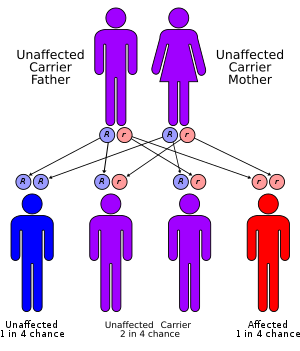Acheiropodia
Acheiropodia (ACHP), is an autosomal recessive[1] disorder that results in hemimelia, a lack of formation of the distal extremities.
| Acheiropodia | |
|---|---|
| Other names | Horn-Kolb Syndrome, Acheiropody and Aleijadinhos (Brazilian type) |
 | |
| Acheiropodia has an autosomal recessive pattern of inheritance | |
| Specialty | Medical genetics |
This is a congenital defect which consists of bilateral amputations of the distal upper and lower extremities, as well as aplasia of the hands and feet. It was first discovered and is prevalent almost exclusively in Brazil.[2]
Genetics
ACHP has been associated with a mutation in the LMBR1 gene.[3] The disorder is inherited in an autosomal recessive manner.[1] This means the defective gene responsible for the disorder is located on an autosome, and two copies of the defective gene (one inherited from each parent) are required in order to be born with the disorder. The parents of an individual with an autosomal recessive disorder both carry one copy of the defective gene, but usually do not experience any signs or symptoms of the disorder.
Diagnosis
References
- Escamilla, Ma; Demille, Mc; Benavides, E; Roche, E; Almasy, L; Pittman, S; Hauser, J; Lew, Df; Freimer, Nb; Whittle, Mr (June 2000). "A minimalist approach to gene mapping: locating the gene for acheiropodia, by homozygosity analysis". American Journal of Human Genetics. 66 (6): 1995–2000. doi:10.1086/302921. PMC 1378047. PMID 10780921.
- Freire-Maia, A; Opitz, John M. (1981). "Historical note: the extraordinary handless and footless families of Brazil - 50 years of acheiropodia". American Journal of Medical Genetics. 9 (1): 31–41. doi:10.1002/ajmg.1320090108. PMID 7018242.
- Ianakiev P, van Baren MJ, Daly MJ, et al. (January 2001). "Acheiropodia is caused by a genomic deletion in C7orf2, the human orthologue of the Lmbr1 gene". Am. J. Hum. Genet. 68 (1): 38–45. doi:10.1086/316955. PMC 1234933. PMID 11090342.
External links
| Classification |
|---|